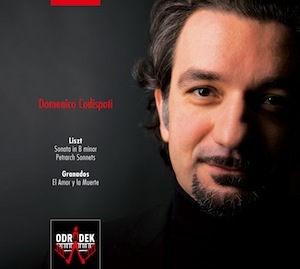
Songs
- 1 Franz Liszt - Sonata in B-Minor - I
- 2 Franz Liszt - Sonata in B-Minor - II
- 3 Franz Liszt - Sonata in B-Minor - III
- 4 Franz Liszt - Sonata in B-Minor - IV
- 5 Franz Liszt - Sonata in B-Minor - V
- 6 Franz Liszt - Sonata in B-Minor - VI
- 7 Enrique Granados - El amor y la Muerte
- artist:Domenico Codispoti
- featured artist:Domenico Codispoti
- release year:2012
- style(s):Romantic Period, Classical Music
- country:Italy
- formats:CD (Compact Disc)
- record posted by:Odradek Records
- label:Odradek Records
- buy this record
Odradek’s fourth: Liszt’s famous B minor Sonata, his Petrarch Sonnets, and Granados El Amor y la Muerte from Goyescas - a romantic program, passionately performed by Italian pianist Domenico Codispoti, making of the disc a musical polaroid of his own emotional journey through their themes of love and death.
---
Artist's statement:
What binds together Margherita and Faust, what sings for Laura in the Sonnets, what brings Fernando to duel to the death in Goyesca, is the red thread of these musical stories. Their meaning, though, certainly goes beyond the descriptive and evocative element, rising above pretense and leaves a lingering question more than a serene conclusion. Liszt’s and Granados’ notes tell of passion, jealousy, ideal love and dreams; though born out of structure and equilibrium, they are not devoid of unpredictability and require instinct from the player.
I think I have always arrived to that last and lonely note of the Sonata in B minor feeling I have each time lived and told a new personal story, with its own surges, contrasts, and moments of calm. Looking for an internal equilibrium that might unite and justify the pieces, I have always been surprised at how different each time my voyage and my involvement was, and I’ve also been, in a certain sense, satisfied by being its “victim”. My approach to the Sonnets has also been at times meditative and at times dramatic, maybe even guiltily languid, with Petrarch’s texts – in Liszt’s “translation” – tracing an emotional path from which I’ve always found it difficult to keep distance in order to look for an objectivity or stylistic coherence. I’ve always been attracted from the first reading to the obscure and unresolved fascination of El amor y la muerte, to the naked and simple beautify of its sad song; a story where breathing and waiting are vital, characteristic and ever changing elements.
In playing these pieces, while I respected the scores, I at the same time used them, rumpling and straining them every once in awhile, thinking egotistically about them as my own personal affairs. This disc is nothing but a photograph, the musical polaroid of one of these moments.
-- Domenico Codispoti
---
Reviews:
“Domenico Codispoti is a sophisticated and poetic pianist who gives imaginative and refined performances of Liszt's Sonata in B Minor, the Petrarch Sonnets, and Granado's El Amor y la Muerte. Codispoti consistently produces a beautiful singing tone, with every note carefully weighted and voiced... [T]he playing is wholly convincing throughout. Codispoti's con- ception of the sonata is enormous and majestic; the three sonnets are more languid than impassioned, but exhibit an exquisite lyricism. The Granados ballade, perhaps a slightly odd inclusion, is given a thoroughly polished and thoughtful performance. The CD is released by the Odradek label, a non- profit endeavor that features outstanding artists who typically might not be represented by a larger label. This ambitious concept is a worthy project, particularly if the recordings that follow are as outstanding as this one.”
Clavier Companion Stephen Pierce November 2012
---
“Domenico Codispoti is tailor-made for Odradek - a distinguished performer with a formidable technique in what appears to be his second recording. His account of Liszt's Sonata is gripping from start to finish, measured in tempo but with a palpable understanding of the overall structure and relish of the work's bigger moments. The benchmarks lie with Argerich, Arrau, Brendel, Pollini, Richter and, of more recent recordings, Paul Lewis. Codispoti may not surpass those, but he nestles in close behind them and his supporting programme will appeal to many. The Tre sonetti del Petrarca in their 1859 guise, S161 - not the earlier 1846 set, S158 - are beautifully rendered, as is Granados' Lisztian El Amor y la Muerte from Goyescas, which shares Tre sonetti's visual impetus.”
International Piano Magazine Guy Rickards September 2012
---
“Codispoti has an excellent technique, which is an absolute requisite in this music... [He] phrases the tunes with affection and certainly does not lack feeling. The climactic statement of the tune in Sonnet No 104... is very fine indeed, and he is nicely veiled in the Sonnet No 123... The recording quality is excellent... Codispoti is clearly an excellent pianist.”
Music Web International Paul Corfield Godfrey, February 13, 2013
---
“Codispoti's Liszt is deliberate and expansive, polished and technically adept. His sonata is steady and mature. His tone is broad, with a lovely sound. It is nice to see the three Sonnets done exquisitely... Like his approach to the sonata, they are understated, and his lyrical approach is convincing.”
American Record Guide
May/June 2013


